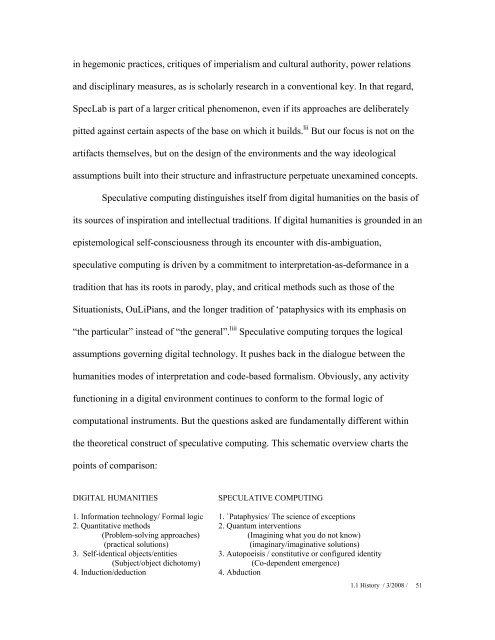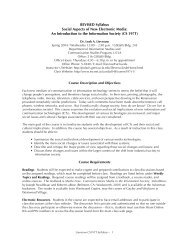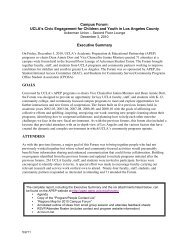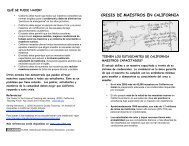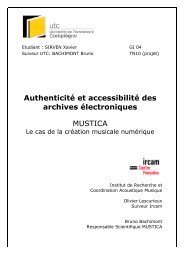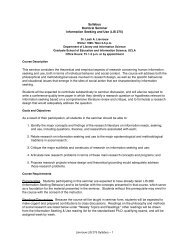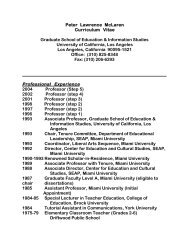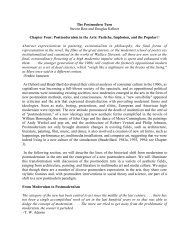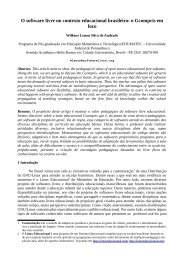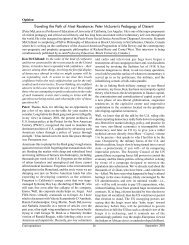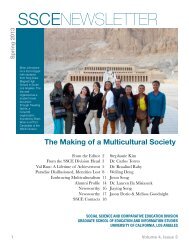1.1 From Digital Humanities to Speculative Computing - UCLA ...
1.1 From Digital Humanities to Speculative Computing - UCLA ...
1.1 From Digital Humanities to Speculative Computing - UCLA ...
You also want an ePaper? Increase the reach of your titles
YUMPU automatically turns print PDFs into web optimized ePapers that Google loves.
in hegemonic practices, critiques of imperialism and cultural authority, power relations<br />
and disciplinary measures, as is scholarly research in a conventional key. In that regard,<br />
SpecLab is part of a larger critical phenomenon, even if its approaches are deliberately<br />
pitted against certain aspects of the base on which it builds. lii But our focus is not on the<br />
artifacts themselves, but on the design of the environments and the way ideological<br />
assumptions built in<strong>to</strong> their structure and infrastructure perpetuate unexamined concepts.<br />
<strong>Speculative</strong> computing distinguishes itself from digital humanities on the basis of<br />
its sources of inspiration and intellectual traditions. If digital humanities is grounded in an<br />
epistemological self-consciousness through its encounter with dis-ambiguation,<br />
speculative computing is driven by a commitment <strong>to</strong> interpretation-as-deformance in a<br />
tradition that has its roots in parody, play, and critical methods such as those of the<br />
Situationists, OuLiPians, and the longer tradition of ‘pataphysics with its emphasis on<br />
“the particular” instead of “the general”. liii <strong>Speculative</strong> computing <strong>to</strong>rques the logical<br />
assumptions governing digital technology. It pushes back in the dialogue between the<br />
humanities modes of interpretation and code-based formalism. Obviously, any activity<br />
functioning in a digital environment continues <strong>to</strong> conform <strong>to</strong> the formal logic of<br />
computational instruments. But the questions asked are fundamentally different within<br />
the theoretical construct of speculative computing. This schematic overview charts the<br />
points of comparison:<br />
DIGITAL HUMANITIES SPECULATIVE COMPUTING<br />
1. Information technology/ Formal logic 1. `Pataphysics/ The science of exceptions<br />
2. Quantitative methods 2. Quantum interventions<br />
(Problem-solving approaches) (Imagining what you do not know)<br />
(practical solutions) (imaginary/imaginative solutions)<br />
3. Self-identical objects/entities 3. Au<strong>to</strong>poeisis / constitutive or configured identity<br />
(Subject/object dicho<strong>to</strong>my) (Co-dependent emergence)<br />
4. Induction/deduction 4. Abduction<br />
<strong>1.1</strong> His<strong>to</strong>ry / 3/2008 /<br />
51


